Electronic Patient File Implementation: UGB224 Business Management
VerifiedAdded on 2023/05/26
|8
|1665
|264
Report
AI Summary
This report analyzes the implementation of Electronic Patient File (EPF) systems in healthcare organizations, highlighting its importance for patient-centered care and evidence-based practice. It examines three critical issues: skill management, training, and organizational environment, which healthcare management must address for successful EPF adoption. The report emphasizes the need for technological skills, adequate training programs for medical staff, and managing the impact on both internal and external organizational environments. Recommendations include proper system maintenance, balancing internal and external environments, and ensuring sufficient financial resources. The study concludes that effective implementation of EPF systems, along with addressing the identified challenges, can lead to improved healthcare outcomes and enhanced patient experiences.

BUSINNESS MANAGEMENT
Paraphrase This Document
Need a fresh take? Get an instant paraphrase of this document with our AI Paraphraser
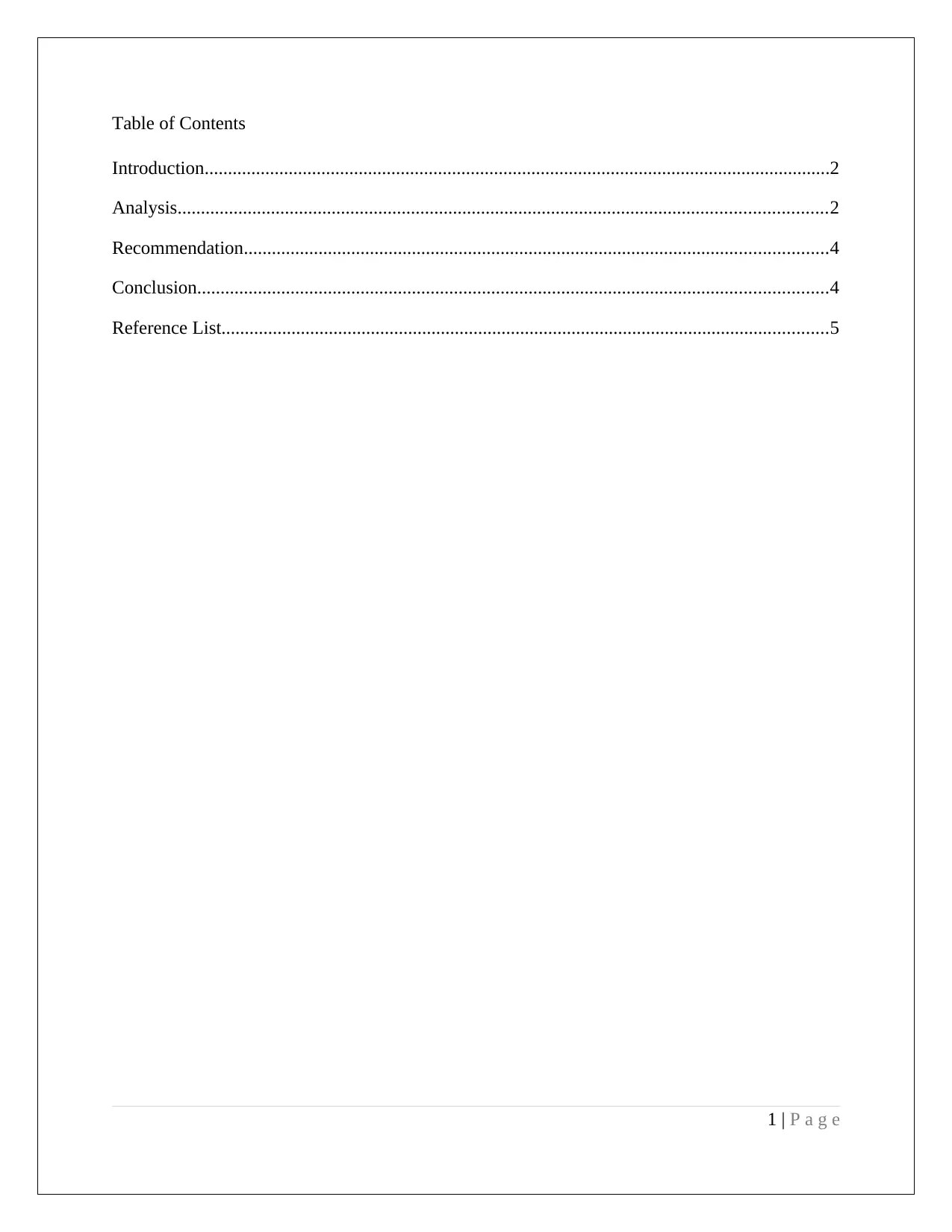
Table of Contents
Introduction......................................................................................................................................2
Analysis...........................................................................................................................................2
Recommendation.............................................................................................................................4
Conclusion.......................................................................................................................................4
Reference List..................................................................................................................................5
1 | P a g e
Introduction......................................................................................................................................2
Analysis...........................................................................................................................................2
Recommendation.............................................................................................................................4
Conclusion.......................................................................................................................................4
Reference List..................................................................................................................................5
1 | P a g e
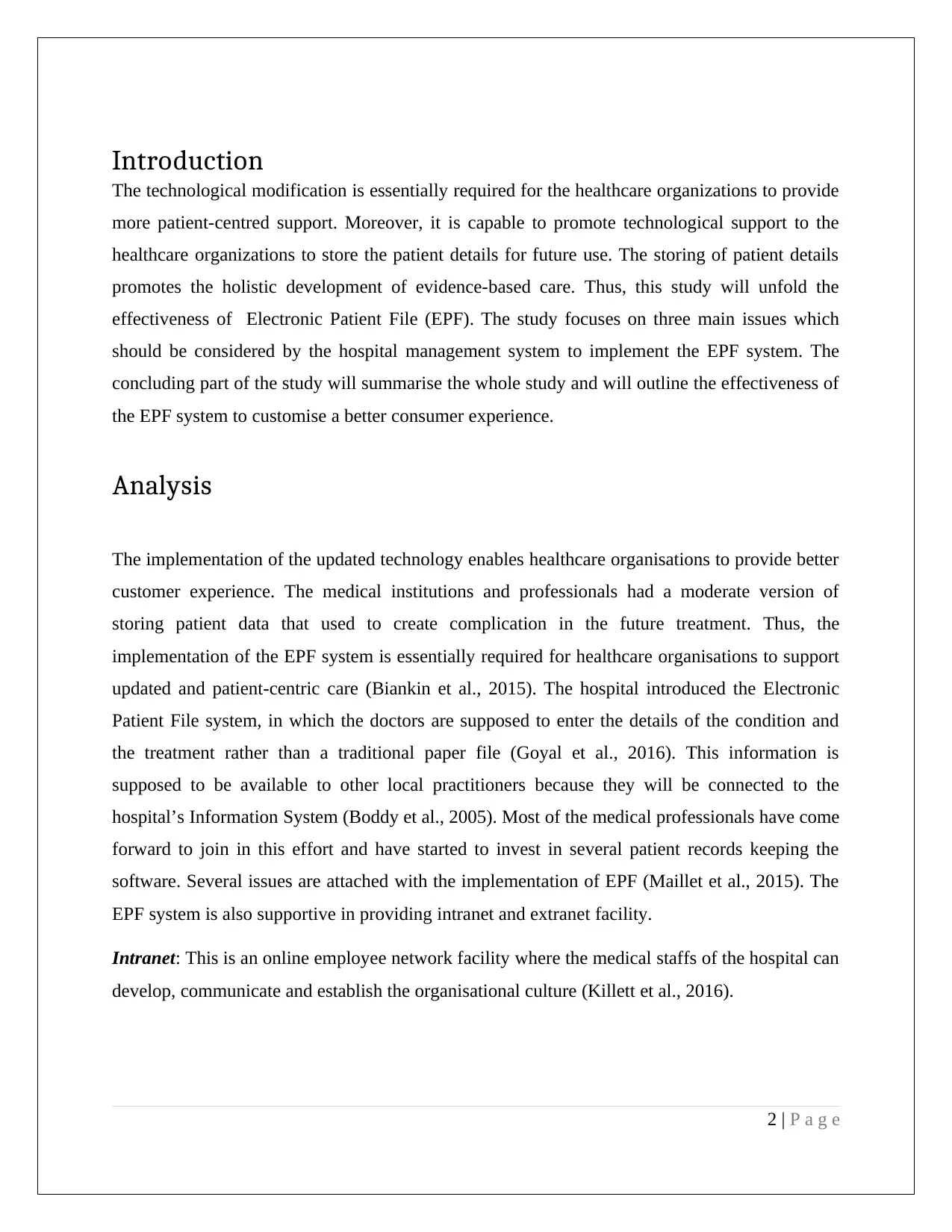
Introduction
The technological modification is essentially required for the healthcare organizations to provide
more patient-centred support. Moreover, it is capable to promote technological support to the
healthcare organizations to store the patient details for future use. The storing of patient details
promotes the holistic development of evidence-based care. Thus, this study will unfold the
effectiveness of Electronic Patient File (EPF). The study focuses on three main issues which
should be considered by the hospital management system to implement the EPF system. The
concluding part of the study will summarise the whole study and will outline the effectiveness of
the EPF system to customise a better consumer experience.
Analysis
The implementation of the updated technology enables healthcare organisations to provide better
customer experience. The medical institutions and professionals had a moderate version of
storing patient data that used to create complication in the future treatment. Thus, the
implementation of the EPF system is essentially required for healthcare organisations to support
updated and patient-centric care (Biankin et al., 2015). The hospital introduced the Electronic
Patient File system, in which the doctors are supposed to enter the details of the condition and
the treatment rather than a traditional paper file (Goyal et al., 2016). This information is
supposed to be available to other local practitioners because they will be connected to the
hospital’s Information System (Boddy et al., 2005). Most of the medical professionals have come
forward to join in this effort and have started to invest in several patient records keeping the
software. Several issues are attached with the implementation of EPF (Maillet et al., 2015). The
EPF system is also supportive in providing intranet and extranet facility.
Intranet: This is an online employee network facility where the medical staffs of the hospital can
develop, communicate and establish the organisational culture (Killett et al., 2016).
2 | P a g e
The technological modification is essentially required for the healthcare organizations to provide
more patient-centred support. Moreover, it is capable to promote technological support to the
healthcare organizations to store the patient details for future use. The storing of patient details
promotes the holistic development of evidence-based care. Thus, this study will unfold the
effectiveness of Electronic Patient File (EPF). The study focuses on three main issues which
should be considered by the hospital management system to implement the EPF system. The
concluding part of the study will summarise the whole study and will outline the effectiveness of
the EPF system to customise a better consumer experience.
Analysis
The implementation of the updated technology enables healthcare organisations to provide better
customer experience. The medical institutions and professionals had a moderate version of
storing patient data that used to create complication in the future treatment. Thus, the
implementation of the EPF system is essentially required for healthcare organisations to support
updated and patient-centric care (Biankin et al., 2015). The hospital introduced the Electronic
Patient File system, in which the doctors are supposed to enter the details of the condition and
the treatment rather than a traditional paper file (Goyal et al., 2016). This information is
supposed to be available to other local practitioners because they will be connected to the
hospital’s Information System (Boddy et al., 2005). Most of the medical professionals have come
forward to join in this effort and have started to invest in several patient records keeping the
software. Several issues are attached with the implementation of EPF (Maillet et al., 2015). The
EPF system is also supportive in providing intranet and extranet facility.
Intranet: This is an online employee network facility where the medical staffs of the hospital can
develop, communicate and establish the organisational culture (Killett et al., 2016).
2 | P a g e
⊘ This is a preview!⊘
Do you want full access?
Subscribe today to unlock all pages.

Trusted by 1+ million students worldwide
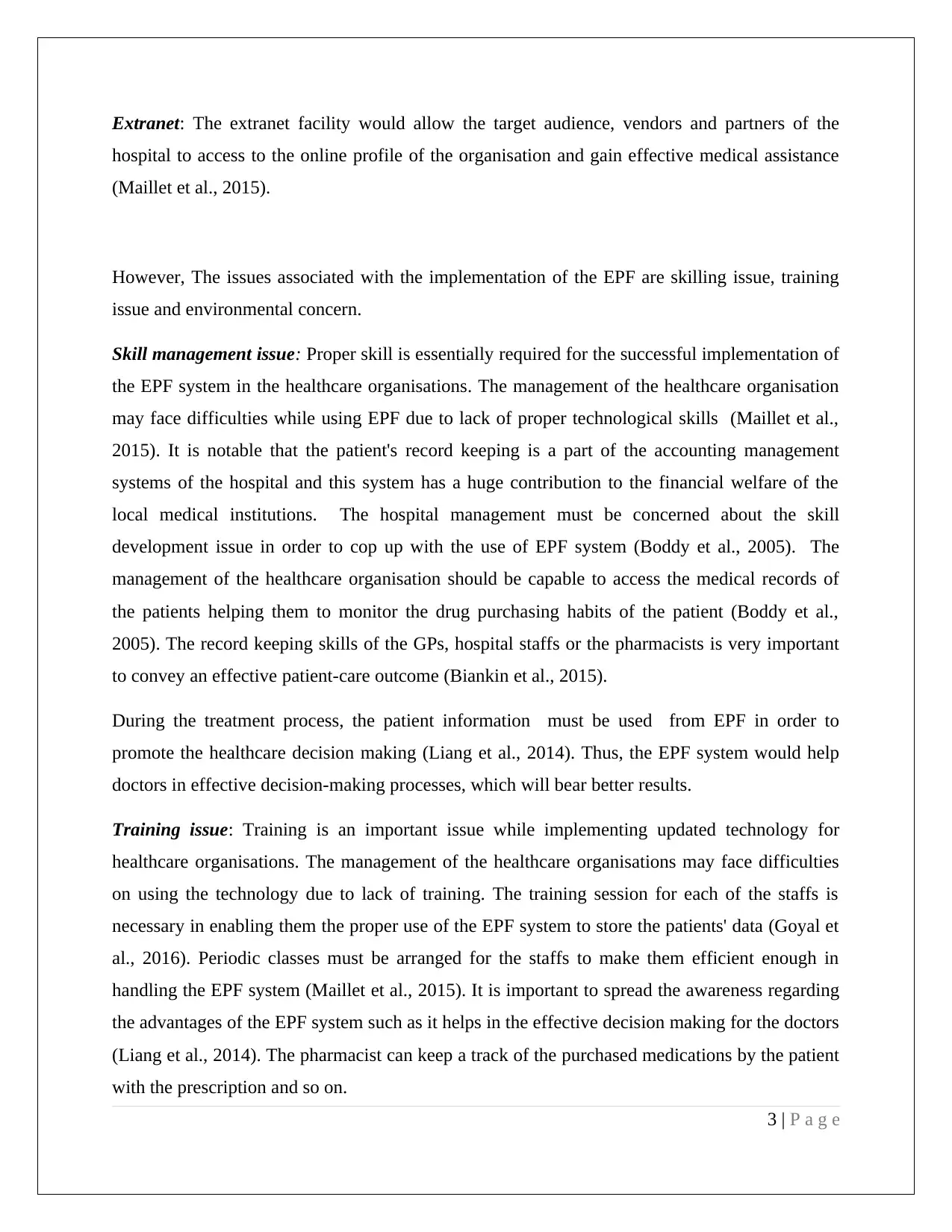
Extranet: The extranet facility would allow the target audience, vendors and partners of the
hospital to access to the online profile of the organisation and gain effective medical assistance
(Maillet et al., 2015).
However, The issues associated with the implementation of the EPF are skilling issue, training
issue and environmental concern.
Skill management issue: Proper skill is essentially required for the successful implementation of
the EPF system in the healthcare organisations. The management of the healthcare organisation
may face difficulties while using EPF due to lack of proper technological skills (Maillet et al.,
2015). It is notable that the patient's record keeping is a part of the accounting management
systems of the hospital and this system has a huge contribution to the financial welfare of the
local medical institutions. The hospital management must be concerned about the skill
development issue in order to cop up with the use of EPF system (Boddy et al., 2005). The
management of the healthcare organisation should be capable to access the medical records of
the patients helping them to monitor the drug purchasing habits of the patient (Boddy et al.,
2005). The record keeping skills of the GPs, hospital staffs or the pharmacists is very important
to convey an effective patient-care outcome (Biankin et al., 2015).
During the treatment process, the patient information must be used from EPF in order to
promote the healthcare decision making (Liang et al., 2014). Thus, the EPF system would help
doctors in effective decision-making processes, which will bear better results.
Training issue: Training is an important issue while implementing updated technology for
healthcare organisations. The management of the healthcare organisations may face difficulties
on using the technology due to lack of training. The training session for each of the staffs is
necessary in enabling them the proper use of the EPF system to store the patients' data (Goyal et
al., 2016). Periodic classes must be arranged for the staffs to make them efficient enough in
handling the EPF system (Maillet et al., 2015). It is important to spread the awareness regarding
the advantages of the EPF system such as it helps in the effective decision making for the doctors
(Liang et al., 2014). The pharmacist can keep a track of the purchased medications by the patient
with the prescription and so on.
3 | P a g e
hospital to access to the online profile of the organisation and gain effective medical assistance
(Maillet et al., 2015).
However, The issues associated with the implementation of the EPF are skilling issue, training
issue and environmental concern.
Skill management issue: Proper skill is essentially required for the successful implementation of
the EPF system in the healthcare organisations. The management of the healthcare organisation
may face difficulties while using EPF due to lack of proper technological skills (Maillet et al.,
2015). It is notable that the patient's record keeping is a part of the accounting management
systems of the hospital and this system has a huge contribution to the financial welfare of the
local medical institutions. The hospital management must be concerned about the skill
development issue in order to cop up with the use of EPF system (Boddy et al., 2005). The
management of the healthcare organisation should be capable to access the medical records of
the patients helping them to monitor the drug purchasing habits of the patient (Boddy et al.,
2005). The record keeping skills of the GPs, hospital staffs or the pharmacists is very important
to convey an effective patient-care outcome (Biankin et al., 2015).
During the treatment process, the patient information must be used from EPF in order to
promote the healthcare decision making (Liang et al., 2014). Thus, the EPF system would help
doctors in effective decision-making processes, which will bear better results.
Training issue: Training is an important issue while implementing updated technology for
healthcare organisations. The management of the healthcare organisations may face difficulties
on using the technology due to lack of training. The training session for each of the staffs is
necessary in enabling them the proper use of the EPF system to store the patients' data (Goyal et
al., 2016). Periodic classes must be arranged for the staffs to make them efficient enough in
handling the EPF system (Maillet et al., 2015). It is important to spread the awareness regarding
the advantages of the EPF system such as it helps in the effective decision making for the doctors
(Liang et al., 2014). The pharmacist can keep a track of the purchased medications by the patient
with the prescription and so on.
3 | P a g e
Paraphrase This Document
Need a fresh take? Get an instant paraphrase of this document with our AI Paraphraser
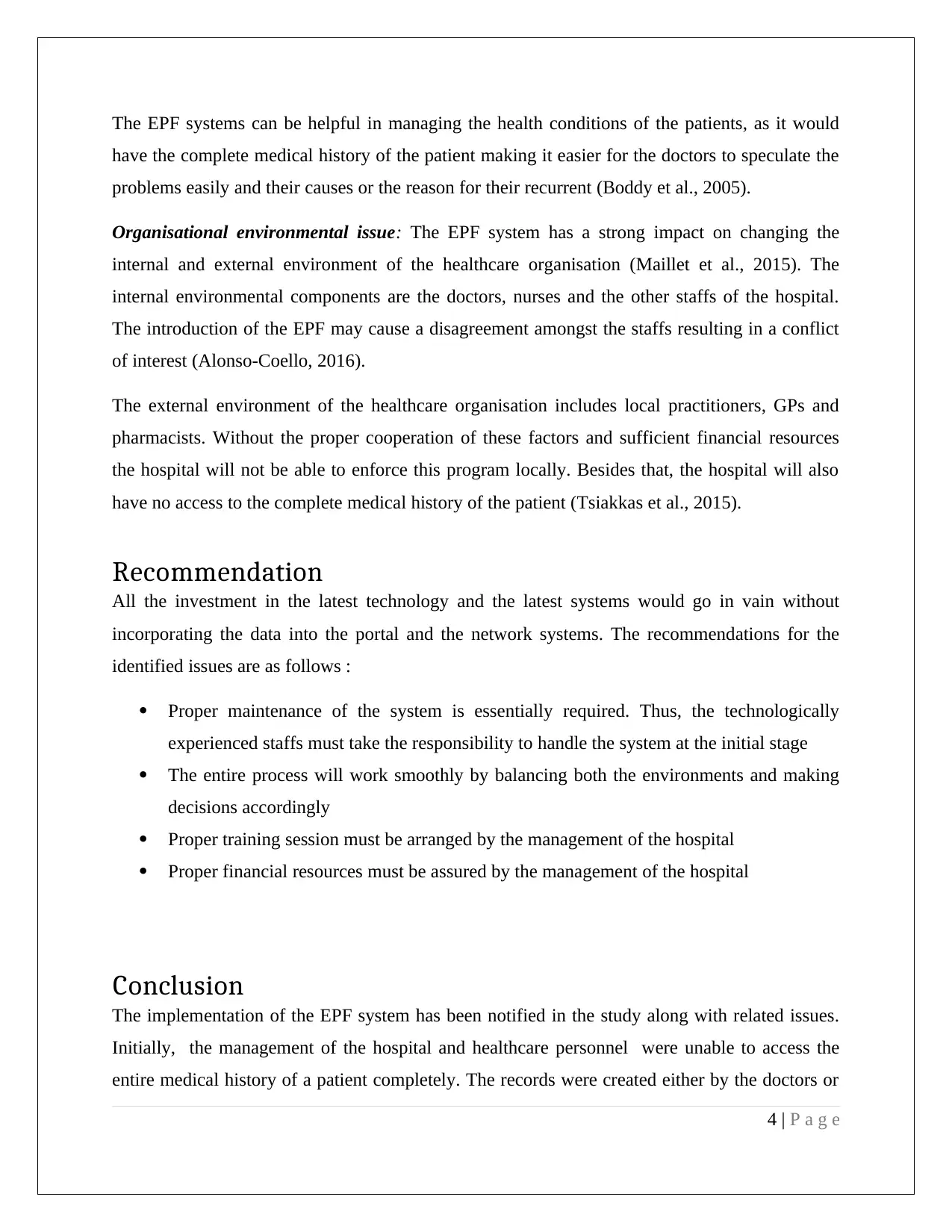
The EPF systems can be helpful in managing the health conditions of the patients, as it would
have the complete medical history of the patient making it easier for the doctors to speculate the
problems easily and their causes or the reason for their recurrent (Boddy et al., 2005).
Organisational environmental issue: The EPF system has a strong impact on changing the
internal and external environment of the healthcare organisation (Maillet et al., 2015). The
internal environmental components are the doctors, nurses and the other staffs of the hospital.
The introduction of the EPF may cause a disagreement amongst the staffs resulting in a conflict
of interest (Alonso-Coello, 2016).
The external environment of the healthcare organisation includes local practitioners, GPs and
pharmacists. Without the proper cooperation of these factors and sufficient financial resources
the hospital will not be able to enforce this program locally. Besides that, the hospital will also
have no access to the complete medical history of the patient (Tsiakkas et al., 2015).
Recommendation
All the investment in the latest technology and the latest systems would go in vain without
incorporating the data into the portal and the network systems. The recommendations for the
identified issues are as follows :
Proper maintenance of the system is essentially required. Thus, the technologically
experienced staffs must take the responsibility to handle the system at the initial stage
The entire process will work smoothly by balancing both the environments and making
decisions accordingly
Proper training session must be arranged by the management of the hospital
Proper financial resources must be assured by the management of the hospital
Conclusion
The implementation of the EPF system has been notified in the study along with related issues.
Initially, the management of the hospital and healthcare personnel were unable to access the
entire medical history of a patient completely. The records were created either by the doctors or
4 | P a g e
have the complete medical history of the patient making it easier for the doctors to speculate the
problems easily and their causes or the reason for their recurrent (Boddy et al., 2005).
Organisational environmental issue: The EPF system has a strong impact on changing the
internal and external environment of the healthcare organisation (Maillet et al., 2015). The
internal environmental components are the doctors, nurses and the other staffs of the hospital.
The introduction of the EPF may cause a disagreement amongst the staffs resulting in a conflict
of interest (Alonso-Coello, 2016).
The external environment of the healthcare organisation includes local practitioners, GPs and
pharmacists. Without the proper cooperation of these factors and sufficient financial resources
the hospital will not be able to enforce this program locally. Besides that, the hospital will also
have no access to the complete medical history of the patient (Tsiakkas et al., 2015).
Recommendation
All the investment in the latest technology and the latest systems would go in vain without
incorporating the data into the portal and the network systems. The recommendations for the
identified issues are as follows :
Proper maintenance of the system is essentially required. Thus, the technologically
experienced staffs must take the responsibility to handle the system at the initial stage
The entire process will work smoothly by balancing both the environments and making
decisions accordingly
Proper training session must be arranged by the management of the hospital
Proper financial resources must be assured by the management of the hospital
Conclusion
The implementation of the EPF system has been notified in the study along with related issues.
Initially, the management of the hospital and healthcare personnel were unable to access the
entire medical history of a patient completely. The records were created either by the doctors or
4 | P a g e

by the nurses during the treatment process. The study deals with the three issues which they
might face while implementing the system. The first issue has analysed utilisation of the proper
skill to manage and control the EPF system properly. The second and third issue has discussed
the training issue and organisational environment issue respectively. The effective
implementation of the recommendations can provide effective outcome.
5 | P a g e
might face while implementing the system. The first issue has analysed utilisation of the proper
skill to manage and control the EPF system properly. The second and third issue has discussed
the training issue and organisational environment issue respectively. The effective
implementation of the recommendations can provide effective outcome.
5 | P a g e
⊘ This is a preview!⊘
Do you want full access?
Subscribe today to unlock all pages.

Trusted by 1+ million students worldwide
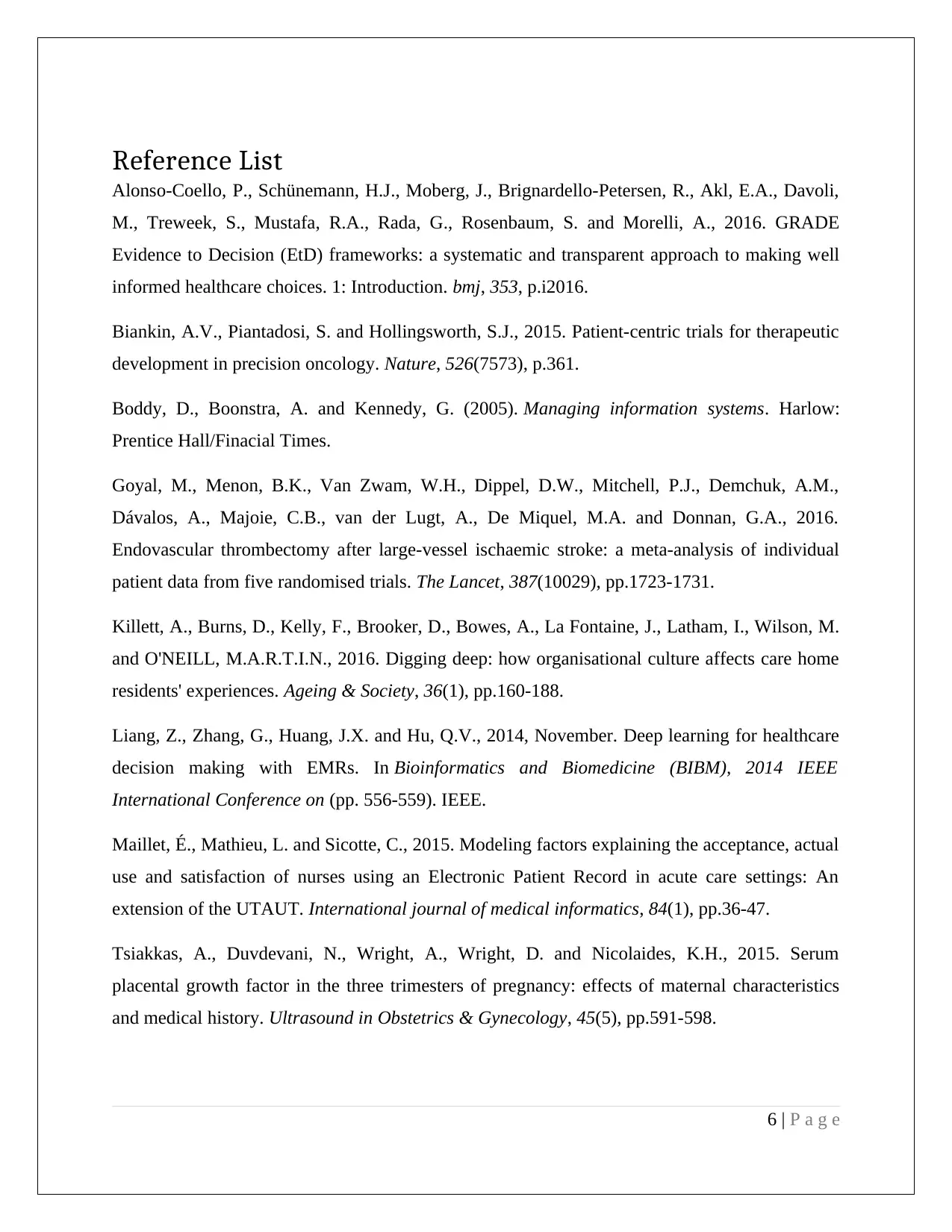
Reference List
Alonso-Coello, P., Schünemann, H.J., Moberg, J., Brignardello-Petersen, R., Akl, E.A., Davoli,
M., Treweek, S., Mustafa, R.A., Rada, G., Rosenbaum, S. and Morelli, A., 2016. GRADE
Evidence to Decision (EtD) frameworks: a systematic and transparent approach to making well
informed healthcare choices. 1: Introduction. bmj, 353, p.i2016.
Biankin, A.V., Piantadosi, S. and Hollingsworth, S.J., 2015. Patient-centric trials for therapeutic
development in precision oncology. Nature, 526(7573), p.361.
Boddy, D., Boonstra, A. and Kennedy, G. (2005). Managing information systems. Harlow:
Prentice Hall/Finacial Times.
Goyal, M., Menon, B.K., Van Zwam, W.H., Dippel, D.W., Mitchell, P.J., Demchuk, A.M.,
Dávalos, A., Majoie, C.B., van der Lugt, A., De Miquel, M.A. and Donnan, G.A., 2016.
Endovascular thrombectomy after large-vessel ischaemic stroke: a meta-analysis of individual
patient data from five randomised trials. The Lancet, 387(10029), pp.1723-1731.
Killett, A., Burns, D., Kelly, F., Brooker, D., Bowes, A., La Fontaine, J., Latham, I., Wilson, M.
and O'NEILL, M.A.R.T.I.N., 2016. Digging deep: how organisational culture affects care home
residents' experiences. Ageing & Society, 36(1), pp.160-188.
Liang, Z., Zhang, G., Huang, J.X. and Hu, Q.V., 2014, November. Deep learning for healthcare
decision making with EMRs. In Bioinformatics and Biomedicine (BIBM), 2014 IEEE
International Conference on (pp. 556-559). IEEE.
Maillet, É., Mathieu, L. and Sicotte, C., 2015. Modeling factors explaining the acceptance, actual
use and satisfaction of nurses using an Electronic Patient Record in acute care settings: An
extension of the UTAUT. International journal of medical informatics, 84(1), pp.36-47.
Tsiakkas, A., Duvdevani, N., Wright, A., Wright, D. and Nicolaides, K.H., 2015. Serum
placental growth factor in the three trimesters of pregnancy: effects of maternal characteristics
and medical history. Ultrasound in Obstetrics & Gynecology, 45(5), pp.591-598.
6 | P a g e
Alonso-Coello, P., Schünemann, H.J., Moberg, J., Brignardello-Petersen, R., Akl, E.A., Davoli,
M., Treweek, S., Mustafa, R.A., Rada, G., Rosenbaum, S. and Morelli, A., 2016. GRADE
Evidence to Decision (EtD) frameworks: a systematic and transparent approach to making well
informed healthcare choices. 1: Introduction. bmj, 353, p.i2016.
Biankin, A.V., Piantadosi, S. and Hollingsworth, S.J., 2015. Patient-centric trials for therapeutic
development in precision oncology. Nature, 526(7573), p.361.
Boddy, D., Boonstra, A. and Kennedy, G. (2005). Managing information systems. Harlow:
Prentice Hall/Finacial Times.
Goyal, M., Menon, B.K., Van Zwam, W.H., Dippel, D.W., Mitchell, P.J., Demchuk, A.M.,
Dávalos, A., Majoie, C.B., van der Lugt, A., De Miquel, M.A. and Donnan, G.A., 2016.
Endovascular thrombectomy after large-vessel ischaemic stroke: a meta-analysis of individual
patient data from five randomised trials. The Lancet, 387(10029), pp.1723-1731.
Killett, A., Burns, D., Kelly, F., Brooker, D., Bowes, A., La Fontaine, J., Latham, I., Wilson, M.
and O'NEILL, M.A.R.T.I.N., 2016. Digging deep: how organisational culture affects care home
residents' experiences. Ageing & Society, 36(1), pp.160-188.
Liang, Z., Zhang, G., Huang, J.X. and Hu, Q.V., 2014, November. Deep learning for healthcare
decision making with EMRs. In Bioinformatics and Biomedicine (BIBM), 2014 IEEE
International Conference on (pp. 556-559). IEEE.
Maillet, É., Mathieu, L. and Sicotte, C., 2015. Modeling factors explaining the acceptance, actual
use and satisfaction of nurses using an Electronic Patient Record in acute care settings: An
extension of the UTAUT. International journal of medical informatics, 84(1), pp.36-47.
Tsiakkas, A., Duvdevani, N., Wright, A., Wright, D. and Nicolaides, K.H., 2015. Serum
placental growth factor in the three trimesters of pregnancy: effects of maternal characteristics
and medical history. Ultrasound in Obstetrics & Gynecology, 45(5), pp.591-598.
6 | P a g e
Paraphrase This Document
Need a fresh take? Get an instant paraphrase of this document with our AI Paraphraser

7 | P a g e
1 out of 8
Related Documents
Your All-in-One AI-Powered Toolkit for Academic Success.
+13062052269
info@desklib.com
Available 24*7 on WhatsApp / Email
![[object Object]](/_next/static/media/star-bottom.7253800d.svg)
Unlock your academic potential
Copyright © 2020–2026 A2Z Services. All Rights Reserved. Developed and managed by ZUCOL.





